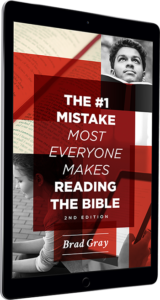Episode 162 – Ruth Pt 2: Clinging to Community
Key Passage(s): Ruth 1:6-22; Numbers 25:1-5; Deuteronomy 23:3
In the face of overwhelming loss, Naomi does what many of us do when we’re hurting: she isolates and cuts herself off from those around her. But Ruth embodies a dramatically different response. As we’ll see, Ruth’s response to the experience of loss becomes the core theme of the entire book and solidifies her place as one of the most inspiring characters of the Hebrew Scriptures. By the end of this episode, you’ll have a deeper appreciation for the power of community to help you practice faithfulness in the face of adversity.
Discussion Questions
- What was your biggest takeaway from the teaching?
- What is your overall impression of Naomi’s response, and can you imagine any reasons why she (and we) might push people away?
- What are some of the stories/experiences in your life where you’ve experienced the “clinging love” of a community?
- One of the great paradoxes of our age is that despite being more “connected” than ever, we live in a world that’s lonelier than ever. How might you/we nurture and cultivate the kind of relationships that make this “clinging love” possible?
- How will you begin living out the truths of this teaching this week?
For Further Study
- Status Quo (featuring Walter Brueggemann) – a short film by The Work of The People
- Strong As Death Is Love by Robert Alter
- Ruth (One Hour. One Book.) by Randall Smith
- Ruth Photo Companion to the Bible by BiblePlaces.com
As an Amazon Associate, we earn from qualifying purchases (at no extra charge to you).





Very good teaching. I was captivated with this presentation, but more thank anything it spoke to my heart. It was mixed with God’s anointing.
Thanks for your encouraging words Joyce!
Loving this Bible study. Not what I expected in addressing the pain of Naomi, Ruth’s loving kindness, but it has spoke to me about processing my own pain of rejection and abandonment from my children and loss. Beautiful!!
Carol, thanks for bearing a part of your story and sharing how the book of Ruth is helping you. That kind of courageous vulnerability and witness to God’s power is so important for our community. Thank you!
Thanks for your teaching!! Yes, community that I found here in Peace Free Lutheran Church in Canal Winchester, Ohio!here I found a family! They act on Loving -kindness!! I have just recently lost my husband of 47 years in Dec.2023! They have given me so much love and support! Started before as he’s been in nursing home here, the reason I moved here!He was battling health issues and dementia! So he’s at peace and with Jesus!! I’ve been saying goodbye for awhile but grief comes in waves thanks to my faith and my new family there’s hope!! Sorry for my long winded text!
It comes in waves. So true! Thanks Debbie for sharing a portion of your story and witnessing to the power of community to bring healing. May it continue to do so for you!
This was an awesome teaching!!!!
It was great until you brought a quote in by Richard Rohr. He is a false prophet and a dangerous one at that.
Can someone provide more information on if the quote was just used or is this organisation involved with any of his “ministries?”
Hi Karah,
Thanks for your note. WTT isn’t involved in any of his ministries. In fact, we’re familiar with the quote not so much from the author as from addiction communities that cite it in a lot of their work.
This teaching touched me, well almost slapped me in the face. My husband passed away 6 months ago after a long illness. I have found it difficult to be around a lot of people, especially going to church without him. This teaching made so much sense to me and let me know I am focusing on me and my pain too much and need to be around people who love me and support me. I look forward to the rest of the teaching on Ruth.
Robin,
We’re sad to hear about the loss of your husband. After my brother-in-law was killed in Iraq, a very kind rabbi spent the better part of a year teaching me the process of Jewish ritual mourning. I’m copying a brief overview of what I learned here for you to ponder. It’s an incredibly powerful and thoughtful process because most people simply don’t know how to respond to pain. So they either don’t respond at all, or they respond in ways that aren’t helpful.
For instance, we’re often to compelled to tell people who are grieving, “If you need anything, just let me know.” But grieving people often don’t know what they need. And secondly, nobody likes asking for help. Comforting people well means, “We knew you’d be exhausted so there are some meals in the freezer for the next three nights, and Brad will be by on Thursday to cut the grass.”
Jewish ritual mourning breaks the process of grief into a year with four clear timeframes (You can read about it in more detail in Lauren Winner’s book Mudhouse Sabbath):
1. Death to burial – This is that shocking time before the funeral. This is reserved for only family and very close friends. Comforters are expected to discern their place and either move near or give appropriate space.
2. Shiva – shiva means “to sit low” or “seven.” It refers to the seven days of mourning after a funeral. The idea of Shiva is simply to be with a hurting person. You form a community of care around them, bringing food and often only engaging them if they feel like talking. It’s the ministry of presence. When Job’s friends come to visit him and they “sit” with him in dust and ashes for seven days in silence, they’re doing shiva. Then they open their mouths and try to explain to Job why his suffering has happened. I’ve always loved Job’s response: “Oh that you would be completely silent and for you that would be wisdom.” (Job 13:5). Shiva is the powerful ministry of presence that says, “This hurts. I’m with you in it. I’m going to look at it and feel it with you, and resist the urge to explain it. We’re just going to feel it together.” It’s amazing how difficult this is for many Christians, many humans for that matter.
3. Then there’s the thirty days after the funeral. During this time, mourners aren’t expected to come to church or go to celebrations. It’s like the community’s way of saying, “We don’t expect you to show up at the party or at worship and pretend to be happy.”
4. Then there’s the final and longest time period of one full year. If you’re mourning a parent, this is called Kaddish. In traditional Jewish mourning, a mourner will pray the mourner’s prayer (the Kaddish) often with other people until the year is over. Interestingly, the Kaddish is very similar in language to the Lord’s Prayer. It has almost nothing to do with loss or grief. Instead, it’s a prayer about God’s character. The way the rabbi described it to me, it’s like the people reciting the prayer with you are telling you, “I know it probably doesn’t feel like these words are true right now, but they are. So we’re going to pray them with you, every day, and when you can’t mean them, we’re going to mean them for you. And we’re going to keep meaning them for you, until you heal and can again live into the truth of these words.”
I saw this happen 20 years ago at our church in Michigan. Our dear friends lost their first child at full term. She caught a virus in the hospital and died after 24 hours. It crushed them. Back then, one of the worship songs we sang regularly was Blessed Be the Name of the Lord by Matt Redman. They’d come to church, but they couldn’t bring themselves to sing the words, “You give and take away, you give and take away, my heart will choose to say, Lord blessed be Your name.” Instead, they’d just weep.
But after about a year, something shifted. They had this insight: All those times they couldn’t bring themselves to sing those words, the community around them sang the words for them. Until they were healed enough to sing them again and mean them. Sometimes, we don’t have words of our own, and we have to borrow the words of others. I think this is why it’s SO IMPORTANT that we actually sing when we stand in worship because we might just be singing the salvation of the person next to us and not even know it.
We hope that as you journey through grief, you’ll find the kind of thoughtful, loving people you can lean on. Grace + Peace to you Robin!